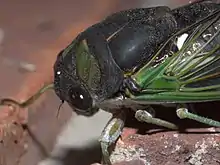Neotibicen tibicen
Neotibicen tibicen, known generally as the swamp cicada or morning cicada, is a species of cicada in the family Cicadidae. It used to be known as Tibicen chloromerus.[1] It is widespread across much of the eastern and central United States and portions of southeastern Canada.[2]
| Neotibicen tibicen | |
|---|---|
_(14898035959).jpg.webp) | |
| Scientific classification | |
| Kingdom: | |
| Phylum: | |
| Class: | |
| Order: | |
| Family: | |
| Genus: | |
| Species: | N. tibicen |
| Subspecies: | |
| Binomial name | |
| Neotibicen tibicen | |
| Synonyms | |


Notes
This species is reproductively active particularly in the morning; hence its common name, the morning cicada.[1] It used to be widely known as Tibicen chloromerus, but in 2005 the name was changed to Tibicen tibicen because the species was determined to have been described first under this specific epithet.[3] Likewise, the name of this cicada was changed again in July 2015 due to taxonomic reconfiguration and evaluation of genetics and physiology of the genus Tibicen. The genus Tibicen is now restricted to only a few European cicada species. This is the most frequently encountered Neotibicen species because males prefer to sing from low branches of trees. There are two poorly defined subspecies, N. tibicen tibicen and N. tibicen australis, with the latter replacing the nominate subspecies in peninsular Florida, southern Georgia, and southern Alabama.[1]
Parasites
Certain species of flies are known to be parasitoids of adult N. tibicen, such as some Sarcophagidae in the genus Emblemasoma.[4][5] The female flies have enlarged hearing structures used to detect the call of male cicadas. When a cicada is located the female lands on the host and deposits living larvae. The larvae burrow quickly into the cicada, where they feed, sometimes eating the insect completely and causing its death.
References
- Sanborn, Allen F. (May 2008). "The Identity Of Cicada tibicen Linné [=Tibicen chloromerus (Walker, 1850)] (Hemiptera: Cicadoidea: Cicadidae)". Entomol. News. 119 (3): 227–231. doi:10.3157/0013-872X(2008)119[227:TIOCTL]2.0.CO;2. Retrieved 17 February 2014.
- Tron, N; Stölting, H; Kampschulte, M; Martels, G; Stumpner, A; Lakes-Harlan, R. "The Auditory System of the Dipteran Parasitoid Emblemasoma auditrix (Sarcophagidae)". J Insect Sci. 16 (1): 90. doi:10.1093/jisesa/iew062. PMC 4989904. PMID 27538415.
- Stucky, BJ. "Eavesdropping to Find Mates: The Function of Male Hearing for a Cicada-Hunting Parasitoid Fly, Emblemasoma erro (Diptera: Sarcophagidae)". J Insect Sci. 16 (1): 68. doi:10.1093/jisesa/iew048. PMC 4932889. PMID 27382133.